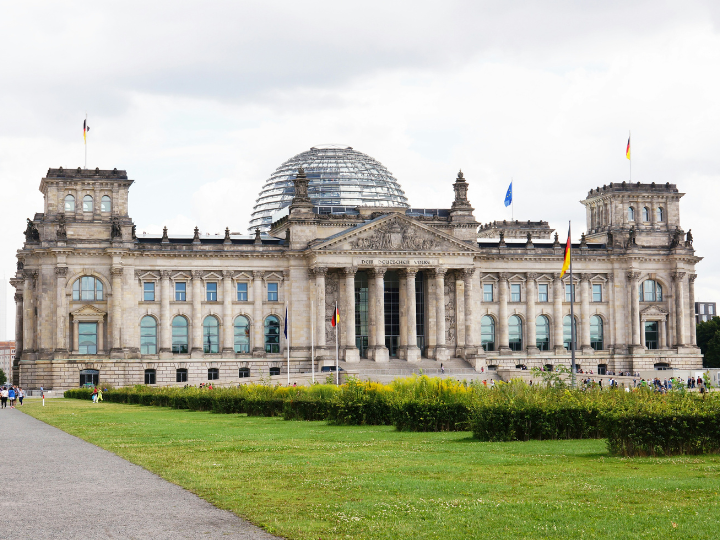by Martin Banks
The bitter conflict in Ukraine and elsewhere
underlines the urgent need for the UN to return to its traditional peacekeeping
role and "full international" dialogue.
That is the keynote message to emerge from an
international meeting to mark the 70th anniversary of the historic Yalta
conference.
"Yalta-45: Past, Present, Future" was
dedicated to the landmark meeting of the leaders of the "anti-Hitler
coalition" - Joseph Stalin, Franklin Roosevelt and Winston Churchill.
It was held to coincide with the conference when the
"Big Three" met from February 4-11,1945 to map out Europe's post WW2
future.
Once again, the Crimean resort of Yalta and the
Livadiya Palace, the old summer palace of the tsars, was the venue.
Over the course of that seven day meeting 70 years ago
the three war leaders made plans for the final defeat and fate of Germany,
making key decisions which would shape world history for rest of the 20th century
and beyond.
Peace and reconciliation was also the theme of the
2015 conference, organised by the International Association of Peace Funds,
Civil Society Development Foundation and Foundation for Historical Outlook.
The two-day international forum was attended by 130
political scientists, politicians and civil leaders from 23 countries and
covered 25 presentations, provoking lively and evidence-based debates.
Sergey Naryshkin, Speaker of the Russian parliamentary
lower house, urged the West to "stop using Crimea as a cause for
confrontation" adding, "I hope international discussions like this
will contribute to a better mutual understanding and our Western partners will
finally stop using Crimea as a cause for confrontation."
Naryshkin, also head of the Russian Historical
Society, said only an "open and fair" dialogue could bring the
current "spiral of mistrust" in Europe to an end and "stop
provocations and unilateral actions."
He said, "The only way out of this spiral of
mistrust is to launch an open and fair dialogue on the true pressing problems
and real rather than alleged threats to European security and also stop
provocations and unilateral actions."
Other speakers at the scientific conference included
Tatjana Zdanoka, a Latvian MEP for the Greens Party, who said, "The
postwar generation must fight for the historical truth although I have to say
that this struggle is becoming more and more tough."
Further contribution came from Alain Guyot, of French
civil society group Le Roue-Europe who cautioned that, with "war at the
doors of Europe" the "valuable" contribution of such events
"must not stop here".
His call for an international "conference for
peace" was partly echoed in the wording of a resolution overwhelmingly
adopted by participants.
This states that the far reaching decisions reached
seven decades ago by Churchill, Roosevelt and Stalin had established a
"reliable and robust architecture", based on the leading world
powers' influence.
This accord had become an important landmark in
diplomatic history and the "ultimate point" of the allies'
cooperation during WW2.
Tellingly, it goes on to add, however, that the
post-WW2 system of international relations, as well as European security
structure, had since been "destroyed."
The focus of the forum was on those processes that had
"stimulated" this collapse and "overall tension in
international relations."
In light of this, the resolution therefore calls for a
return to the "dominant peacekeeping role of the United Nations, full
international dialogue and rejection of a unipolar world model."
It also condemns "attempts to revive ideas of
Nazism of any kind", underlines the "timeliness and
significance" of the post war alliance and calls for an
annual international "Day of Honour" in recognition of
this, possibly on 25 April,the day, in 1945, when Soviet and
American troops met at the River Elbe, near Torgau in Germany marking an
important step toward the end of the war.
This contact between the Soviets, advancing from the East,
and the Americans, advancing from the West, meant that the two powers had
effectively cut Germany in two.
The international community, says the
resolution, should "in the spirit of Yalta"
additionally strive for "earnest collaboration and constructive
dialogue."
Before the meeting in 1945, it had already been
decided that Germany would be divided up into zones to be occupied and
administered by the Soviet Union, the United States, Britain and France.
It had
also been agreed that once the Allied forces entered Germany, the German war
machine and military would be disassembled.
At their historic meeting, the Allied leaders agreed
that their only obligation to Germany was to provide the bare minimum to ensure
the country's population could survive following the defeat.
These provisions
seemed to reflect that important lessons had been learnt from the end of the
First World War - that defeating, punishing and then abandoning Germany would
likely lead to long term resentment and reprisals.
Prior to the conference, Roosevelt and Churchill
agreed to meet in Malta for preliminary discussions, and as Churchill famously
declared in his message to the U.S President "No more let us falter!
From
Malta to Yalta! Let nobody alter!" Anatoly Karpov, President of the International Peace
Foundations Association (IPFA), said that, given the 70th anniversary, last
week's conference in Yalta was particularly timely, adding, "The
agreements of 1945 became a good example of interaction between the three
great powers in pursuing peaceful coexistence."
He added, "'The world has experienced a lot of
changes since then, including the growth of nationalism and disruption of
national states."
The 1945 Yalta conference probably represented the
high-water mark of Allied wartime collaboration and, in recognition of this, a
monument to the three world leaders was unveiled front of the Livadia Palace at
the close of "Yalta-45: Past, Present, Future."
The monument, entitled 'The Big Three', is a ten-ton
statue and the work of Russian sculptor Zurab Tsereteli.
It is a fitting memorial to those highly historic
events back in February 1945.




 By: N. Peter Kramer
By: N. Peter Kramer

